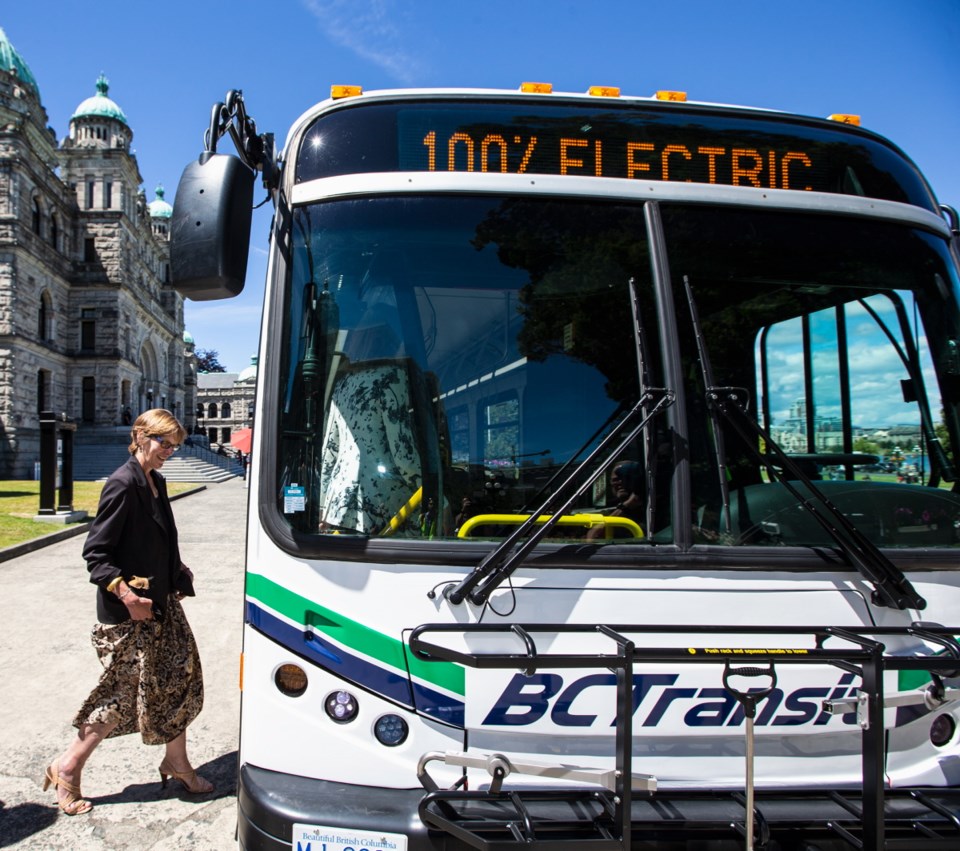B.C. Transit is welcoming an electric bus to its regular fleet on July 23, marking what could be the first of many more to come.
The bus was unveiled outside the legislature on Tuesday.
B.C. Transit said in November that it was taking another look at electric-bus technology, then started a six-month trial in April that includes putting one of the buses into revenue service July 23. In its first week, the quiet-running vehicle will spend time on Route 2 to James Bay, Route 4 to the University of Victoria, Route 11 to Tillicum Centre and Route 27 to Gordon Head.
“This is really important to us because we want to get bikes on the bus, get some strollers, pack that bus full of people, use the air conditioning and then really test the performance of how it’s doing,” said Erinn Pinkerton, B.C. Transit’s interim president and CEO.
Until now, the bus has just been going for test runs.
“The trial in itself is scheduled to go to about October,” Pinkerton said. “And what we’re going to do is … take all that information and use that to guide our assessment of where the technology is going, with our goal of creating a zero-emissions fleet.”
B.C. Transit will confer with bus manufacturer Build Your Dreams, a Chinese company often referred to as BYD, to look at possible refinements specific to B.C.
The bus presents different challenges than a conventional diesel model, Pinkerton said.
“A new technology always requires us to look at new ways of operating.”
For instance, the bus runs on a 324 kilowatt-hour battery — enough power to move five Teslas — and Pinkerton said that means studying such things as the battery’s range and the time it takes to charge.
Right now, it is being charged for three to four hours overnight, which keeps the bus going for nine to 11 hours — or about 250 kilometres.
B.C. Minister of Transportation Claire Trevena said the electric-bus trial is an exciting step for B.C. Transit.
“We are committed to reducing greenhouse gases in this province significantly and having the electric bus will help in that way.”
Trevena said B.C. Transit has already worked with buses fuelled by compressed natural gas. There are 120 in use around B.C.
“I’ve asked ministry staff to get a report on how B.C. Transit is reducing its emissions,” she said. “B.C. Transit is fundamental to transportation in this province and communities across the province and we want to make sure that it is playing its part in ensuring that greenhouse gases are cut.”
Trevena said she hopes more electric buses will follow.
B.C. Transit supports the province in its efforts to cut down on greenhouse gases, Pinkerton said. “Anything we can do to move toward a low-emissions, green fleet is going to help that.”
At present, there are 1,000 buses in the provincial fleet. Pinkerton said that electric buses generally cost about twice as much as conventional models that run on diesel, but can cost much less to operate.
A diesel bus typically costs from $500,000 to $1 million.
Partners in the trial are the UVic Sustainability Lab and B.C. Hydro, which wants to determine the potential impact of electric buses on the power grid.
A real change is coming, Pinkerton said. “We will go emission-free. We will go green. It’s just going to be in terms of how quick do we accelerate that life-cycle replacement of our fleet, and how we can get there.”



